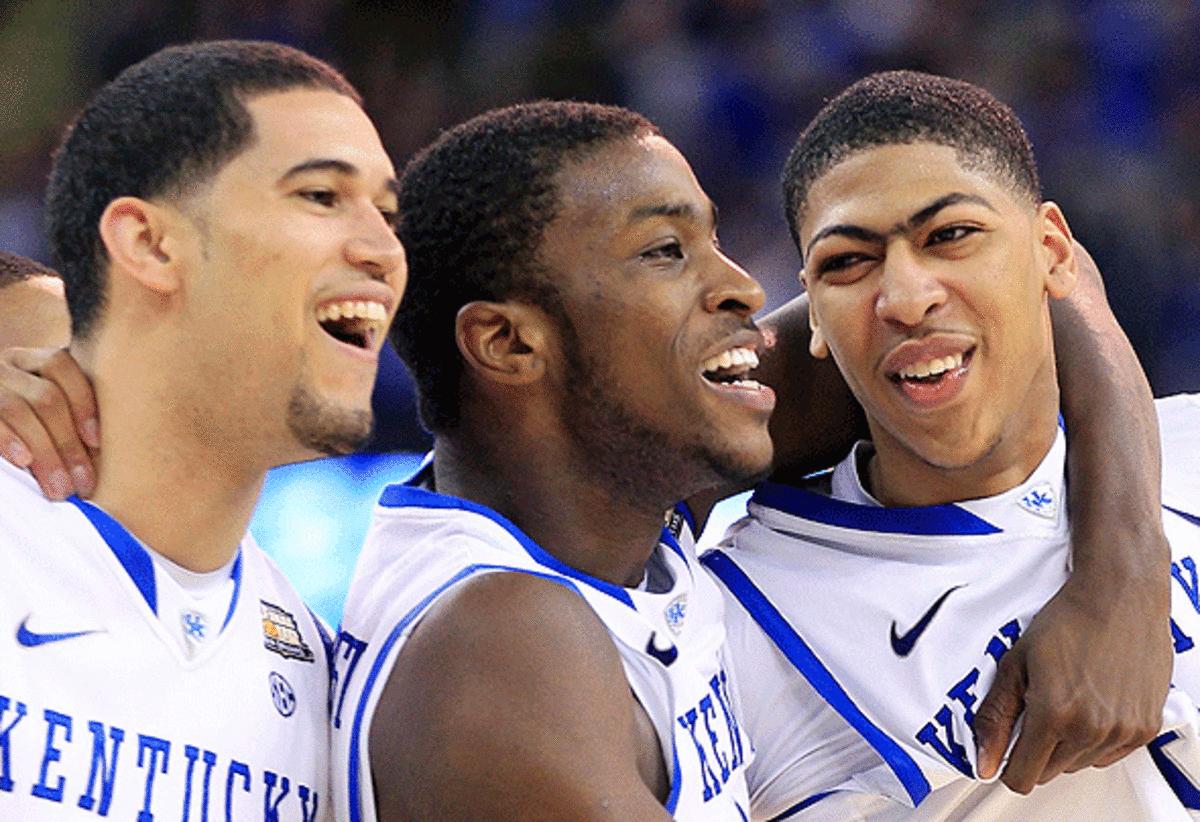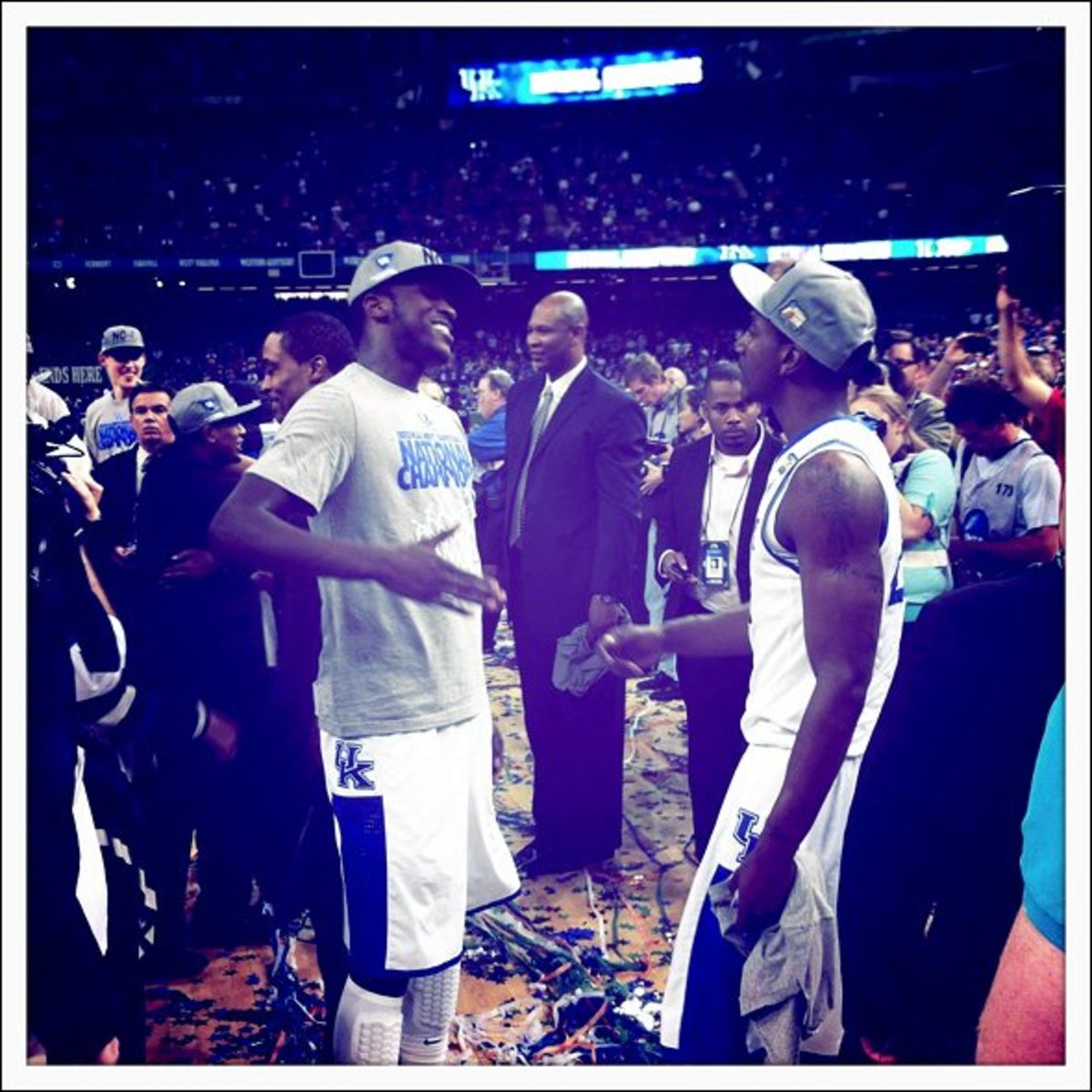Kentucky's (Big) Blueprint For The Ages

Michael Kidd-Gilchrist (center) was the heart of Kentucky's national title team. (REUTERS/Lucy Nicholson)

NEW ORLEANS -- This is the condensed-timeline era of college basketball. Arrive in June, leave in April: As a one-and-done, you must maximize every minute if you want to have a legacy. You best savor your last days as a kid before the business abruptly forces you to grow up. And so on the morning of the 2012 national championship game, Kentucky freshman Michael Kidd-Gilchrist rose uncharacteristically early, at 5:30 a.m. in the hotel room he shared with fellow freshman Anthony Davis, his best friend and the National Player of the Year.
Gilchrist's first thought? "It's going to be a great day." His was the kind of optimism that needed to be shared, and so he soon roused Davis by blasting Jay-Z on his speakers and screaming, "WE'RE FINALLY HERE!" Davis demanded quiet, to no avail. This was a precocious team that took the nation by storm, grabbed a No. 1 ranking and won 37 out of its first 39 games; its stars' last morning as teammates was going to be loud.
All coach John Calipari would ask them to do, later that day, was deliver "a game for the ages." There was potential for history-making, and everyone knew it. Their perpetually defensive coach and his kids had something to prove: that they weren't just a band of youngsters who won on sheer talent, but a team that defended, that shared the ball, that subsumed seven NBA-bound egos into a hyper-efficient, attacking, unselfish monster of a champion. What they did was beat Kansas 67-59, in a game where Davis scored just six points but grabbed 16 rebounds, blocked six shots and had five assists; the biggest play came on defense, when Kidd-Gilchrist put the kibosh on the Jayhawks' comeback attempt by blocking a layup with 1:03 left; and potentially the lowest-drafted member of their starting lineup, sophomore shooting guard Doron Lamb, led them in points with 22.
MANDEL: Jayhawks' second-half push comes up short
There were no shots in this game fit for One Shining Moment, but there was this scene: of Davis embracing Kidd-Gilchrist, whose eyes were welling with tears, and Davis telling him two things. "This is what we came for, to win a national championship," and that "it don't stop here at all." What he meant was that they had greater days ahead in the NBA. They showed up as McDonald's All-Americans in the summer, bought into Calipari's system, worked like mad, and may depart as the Nos. 1 and 2 picks in the NBA Draft. But what they leave behind is a new model for a college title team. Their school has won eight times since the NCAA tournament began in 1939, but there has never been a champ like Kentucky in 2012. What they proved was that the stockpiling one-and-dones model, once thought to be a folly, can actually work.
*********
Calipari's blueprint cannot easily be duplicated, because it relies on rare assets and rare personalities. It took a salesman, and he is the greatest one in the game, first to convince five-star Class of 2011 recruits Kidd-Gilchrist, Davis, point guard Marquis Teague and forward Kyle Wiltjer to sign on to what Calipari called a "players-first program" that held their professional futures as its highest concern. Then it took a coach to convince them that the best way to help their NBA stock was to be unselfish -- that Davis and Kidd-Gilchrist, as Calipari likes to say, would be fine with "taking the fourth- and fifth-most shots on the team." It took a few holdovers from the previous band of one-and-done hopefuls (sophomores Terrence Jones and Lamb, who were de facto veterans) to beef up the rotation, along with one homegrown senior, Darius Miller, who was willing to drop into the role of sixth man to make way for the new kids.
It took a rule -- the NBA's mandate that all these phenoms attend college for at least one year -- and someone who knew how to capitalize on it. "I don't like the rule, but it's a rule," Calipari said. "The choice is you recruit players that aren't as good as these players" -- or you're one of the teams that has to deal with these players. It took him landing a transcendent player in Davis, who had an NCAA freshman record 186 blocks this season and is an athletic specimen that the sport hasn't seen in a long, long time. Louisville's Rick Pitino compared Davis' defensive dominance to that of Bill Russell, and he has occasionally been referred to as an alien. Six-foot-11 humans are not supposed to move like Davis moves. An NBA personnel director said this week that "trying to put Davis in context of other prospects is an exercise in futility, because he's so unique."
While Davis was impacting opponents' shots, Kidd-Gilchrist was impacting the Wildcats' internal culture. It took what Calipari called a "servant leader" to elevate this team from a band of ranked recruits to a true contender. When the 6-8 forward from Somderdale, N.J., famously asked that Miller, who was in a late-season slump, be allowed to start in his place during the SEC tournament final -- a move that re-energized Miller's offense in time for the NCAAs -- it was of a piece with Kidd-Gilchrist had been doing all season. His influence started from the moment he arrived in June and brought his maniacal work ethic to their pickup games, first with just the team, and later against NBA players who trained in Lexington during the lockout.
"We were all kind of shocked by it," junior Jon Hood said of Kidd-Gilchrist's intensity. "He forced us to raise our level. ... We needed him, and we wouldn't be where we are without him."
By Christmas break, Kidd-Gilchrist had so endeared himself to Kentucky's Big Blue Nation that an "MKG for MVP" campaign was underway, but he and Calipari felt that the team still wasn't on a championship trajectory. Calipari planted the seed for a "breakfast club," telling Kidd-Gilchrist about the voluntary morning workouts Michael Jordan, Scottie Pippen and Ron Harper held during the Chicago Bulls' 72-win 1997-98 season. A less-focused freshman would have been distracted by family troubles -- Gilchrist spent Dec. 23 in a New Jersey hospital at the bedside of his mother, Cindy Richardson, who had an undisclosed illness -- but after he returned to Lexington, he began rounding up teammates for 6:30 a.m. weight-lifting and shooting sessions. The task fell on him, he said, "Because I wanted to be a leader. And I work so hard. That's it."
When the Wildcats' shot at making history looked as if it might slip away, it took Gilchrist to save them with a hustle play for the ages. Kentucky was up by 15 with 5:14 left, but it let Kansas, which had been making comebacks all tournament, cut the lead to five with 1:37 to go. On the Jayhawks' next possession they called for the same backdoor play that helped them beat Missouri in their overtime epic in Lawrence. Kidd-Gilchrist got duped: He overplayed Tyshawn Taylor on the right wing, and Elijah Johnson delivered a pinpoint bounce-pass when Taylor made his back-cut to the rim. But as Taylor rose for a layup, Kidd-Gilchrist made a miraculous, Hakim Warrick-level recovery, blocking the ball off the glass, then helping force a turnover a few seconds later.
"Mike," Taylor would say later, "didn't quit on that play."
Asked to describe that play on the press-conference dais, Kidd-Gilchrist first apologized to Calipari, for getting beat. But the freshman could not find the words to illustrate what he had done. All he said was: "I just blocked the shot, so ... I don't know. That's it."
*********
[wpvideo eGlDJxNv w=590]
Kidd-Gilchrist, despite his wonderful March -- he had 24 points and 10 rebounds against Indiana in the Sweet 16, 19 points against Baylor in the Elite Eight, and 11-and-6 against Kansas in the title game -- was making his first appearance at an NCAA tournament press conference. Kentucky sheltered him from major interviews all season, limiting his exposure because of his heavy anxiety in such situations. Kidd-Gilchrist played the clown before games, performing an improvisational dance he calls the "Mike Gillie" in a team huddle. On the court, he was the heart of the Wildcats. Behind-the-scenes, he was the most important player in their title run. But in front of the media, he's a different person.
For all he has achieved on the court, Kidd-Gilchrist has had deep struggles away from it. He stutters and flinches when responding to reporters' questions, some of which, as his star rose in the tournament, were about the tragedies that defined his childhood and gave him the drive to succeed as a basketball player. His father was shot and killed when Gilchrist was two years old, and the uncle who stepped in as his guardian, Darrin Kidd, died of a heart attack on Nov. 10, 2010, just hours before Michael planned to sign his letter of intent with Kentucky. Gilchrist changed his last name to Kidd-Gilchrist to honor Kidd, whom he calls "my best friend." To every game this season, he has carried with him a framed, sepia-toned photo from Kidd's wedding day. In the picture is a smiling, nine-year-old Gilchrist, looking like it's the happiest moment of his life.
Kidd-Gilchrist endured that press conference, in which Calipari, ever the spin-master, tried to convince reporters that the title didn't matter to him all that much. He claimed it was still about the players, and not him. "Now I can get about my business of coaching basketball," Calipari said. "I don't have to hear the drama. I can just coach now. I don't have to worry. If you want to know the truth, it's almost like, 'Done, let me move on.'"
The endless debate over the feasibility of the Calipari Plan had obviously worn on him, but why was he putting up a facade, rather than declaring himself vindicated? Kidd-Gilchrist did not say anything then -- he only answered two questions, both briefly -- but felt free enough to comment once he returned to the locker room. Did the title not mean anything to Calipari, he was asked?
"I don't buy that at all," Kidd-Gilchrist said. "I mean I used to, but not anymore."
Dissent: A sign that the kids are growing up and getting ready to leave the fold. Kidd-Gilchrist was sitting in front of a locker that contained four things: his neatly folded warmups, a banana, a strand of the title-game net, and that framed picture from Kidd's wedding. His smile, for once during an interview, was as wide as the one in the photo, and he did not seem nervous. His coach may have been holding back, but Kidd-Gilchrist wasn't. This was the end. This was a one-and-done team for the ages. "This," Kidd-Gilchirst said, "is the happiest I've ever been."

